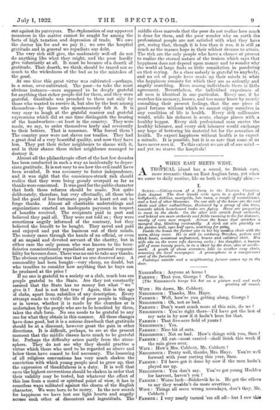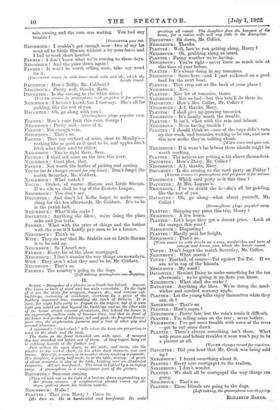WHEN EAST MEETS WEST.
ATROPICAL island has a sound, to British ears, more romantic than an East Anglian farm, yet when we come to daily routine, life on both is strikingly akin :- I.
SCENE.—Sitting-room of a farm in the Eastern Counties. Late August. The door stands wide open to a garden full of hollyhocks, dahlias, marigolds, late roses, a tangle of nasturtiums. and a host of other blossoms. On .one side of the house are the cart sheds and other outbuildings, shadowed by a group of elm trees, towards which homebound rooks are flying. Hens are preparing to roost in the sheds. On the other side stretch fruit orchards, and behind are more orchards and fields running to the far distance, mostly of corn now reaped. Across the house door stretches a mongrel dog, blinking contentedly. A sleek cat sits placidly on the garden wall, eyes half open, watching for gam Inside the house the farmer sits in his big touotlen chair with the worn, shiny cover. He is still in corduroy Breeches, gaiters and thick boots, waistcoat unfastened, braces and colintred shirt. His wife sits on the worn sofa darning socks ; his daughter, a buxom girl of some twenty years, is in a chair by the door, also at needle- work. A youth of about seventeen lolls in. another easy chair, scanning the local newspaper. A gramophone is a conspicuous part of the furniture.
Footsteps outside and a neighbouring farmer comes up to the door.
NEIGHAUR : Anyone at home 1 FARMER : That you, George ? Come in. [The NEIGHBOUR hangs his hat on a pioture nail and nods
greeting all round.
WIFE : Sit down, Mr. Cobbett.
NEIGHBOUR : Thanks, Mrs. Haye.
FARMER : Well, how're you getting along, George ?
NEIGHBOUR : Oh, not so bad.
FARMER Don't want much more of this rain, do we ?
NEIGHBOUR : You're right there—I'd have got the last of my oats in by now if it hadn't been for that. FARMER : That five-acre field of yours NEIGHBOUR : Yes.
FARMER : Nice bit of oats.
NEIGHBOUR : Not so bad. How's things with you, Sam ? FARMER : All cut—most carried—shall finish this week if the rain gives over. WIFE : How's Mrs. Cobbett, Mr. Cobbett ?
NEIGHBOUR : Pretty well, thanks, Mrs. Haye. You're well forward with your carting this year, Sam. FARMER : I'd have got it done by now if the men hadn't played me up. NEIGHBOUR : You don't say. You've got young Heckles for harvest, haven't you ? FARMER : Worse luck—Bolshevik he is. He got the others to say they wouldn't do more overtime. WIFE : Things all seem wrong nowadays, don't they, Mr.
Cobbett FARMER : I very nearly turned 'em all off—but I saw this rain coming and the corn was waiting. You had any trouble I [DAUGHTER goes out.
NEIGHBOUR : I couldn't get enough men—two of my lot went off to Little Slocum without a by-your-leave and I had to work short-handed.
FARMER : I don't know what we're coming to these days.
NEIGHBOUR : And the price down again 1 FARMER : It won't be worth selling soon, take my word for it.
[DAUGHTER comes in with home-made cake and ale, which she
hands round.
DAUGHTER : How's Nellie, Mr. Cobb ett ?
NEIGHBOUR : Pretty well, thanks, Kate. DAUGHTER : Is she coming to the whist drive ? [YOUTH crosses to gramophone and prepares it for action. NEIGHBOUR : I haven't heard, but I daresay. She's all for gadding, like the rest of you. DAUGHTER : Oh, go along with you!
[Gramophone plays popular song.
FARMER : How's your fruit this year, George ? NEIGHBOUR : Pretty well—some of it.
FARMER : Not enough rain.
NEIGHBOUR : That's so.
FARMER : That top orchard of mine, close to Mendip's— nothing like so good as it used to be, and apples don't fetch what they used to either.
NEIGHBOUR : You're right there, Sam. FARMER : I shall sell mine on the tree this year. NEIGHBOUR : Good plan, that. FARMER : Not worth the bother of picking and carting. YOUTH (as he changes record for rag-time): Don't forget the match Saturday, Mr. Cobbett.
NEIGHBOUR : What match ?
YOUTH : Cricket, of course Slocum and Little Slocum. If we win we shall be top of the Eastern League. NEIGHBOUR : You don't say.
DAUGHTER : And don't let Nellie forget to make some- thing for the tea afterwards, Mr. Cobbett. It's to be in the parish hall.
NEIGHBOUR : What'll she make ?
DAUGHTER : Anything she likes ; we're doing the plum cake and jam tarts. FARMER : What with the price of things and the bother with the men it'll hardly pay soon to be a farmer. NEIGHBOUR : That's so.
WIFE : They do say that Mr. Stubble out at Little Slocum is to be sold up.
NEIGHBOUR : So I heard say.
FARMER : Every bit of the place mortgaged.
NEIGHBOUR : I don't wonder the way things are nowadays. WIFE : They aren't what they used to be, Mr. Cobbett. NEIGHBOUR : That's so.
FARMER : The country's going to the dogs. [Left talking, gramophone one-stepping.
II.
SCHITE.—Bungalow of a planter on a South Sea Island. August. The house is built of wood and has wide verandahs. To the right of it are the sheds for waggons, buggies, &c., and various out- buildings, including a cookhouse, overhung by a grove of the feathery ironwood tree, resembling the larch of Britain. It is dark, for night falls early in August in the tropics, but if it were light you would see that beyond the buildings and on the other side of the house stretch coconut plantations, that behind the house is an apparently endless vista of banana trees, and that in front of the house is a garden of hibiscus, red and pink, the fragrant frangi- pani tree, the stephanotis, jasmine and a host of other gay and scented blossoms.
A spasmodic " cluck-cluck " tells where the hens are preparing to roost in the sheds and the bush.
The doors on the front verandah are wide open. A mongrel dog lies stretched out before one of them. A long-legged, bony cat is catching lizards at the further end.
Just within the open doors, in the wide, cool room, sits the planter in his wicker chair, in his white duck trousers, vest and braces. His wife, a native, is in another chair, smoking a cigarette. His daughter, a pretty half-caste, is at the table, sewing. A youth of about seventeen is also at the table, bending over an illustrated magazine. All are barefooted. The room is lighted by a swinging lamp. A gramophone is a conspicuous part of the picture.
DAUGHTER : Someone coming.
[They all look out as the light of a lantern shows approaching up the grassy avenue. A neighbouring planter comes up the steps, putting down his lantern outside.
NEIGHBOUR : Hullo 1 PLANTER : That you, Henry ? Come in. we does so. He is bareheaded and barefooted. He nods
greetings all round. The daughter does the honours of the house, for a native wife will say little to the European.
DAUGHTER : Sit down, Mr. Collier.
NEIGHBOUR : Thanks.
PLANTER : Well, how're you getting along, Henry ? NEIGHBOUR : Oh, grubbing along as usual. PLANTER : Funny weather we're having. NEIGHBOUR : You're right—never knew so much rain at this time of year before. PLANTER : It's about doing in my tomatoes. NEIGHBOUR : Same here—and I just reckoned on a good load for the next boat.
PLANTER : That crop out at the back of your place 1 NEIGHBOUR : Yes.
PLANTER : Nice lot of tommies, those.
NEIGHBOUR : Not so bad—but this rain'll do them in.
DAUGHTER : How's Mrs. Collier, Mr. Collier ?
NEIGHBOUR : A-1, thanks, Mary.
PLANTER : I shall give up growing tommies. NEIGHBOUR : It's hardly worth the trouble. PLANTER : It isn't, what with the rain and labour.
NEIGHBOUR : Been having trouble ? PLANTER : I should think so—two of the boys didn't turn up this week, and tommies waiting to be cut, and now this new strike they're talking about. [WIFE rises and goes out.
NEIGHBOUR : If it wasn't for labour these islands might be worth working. PLANTER : The natives are getting a bit above themselves.
DAUGHTER : How's Daisy, Mr. Collier ?
NEIGHBOUR : A-1, thanks, Mary.
DAUGHTER : Is she coming to the card party on Friday ? [Yours crosses to gramophone and prepares it for action. NEIGHBOUR : Which card party is it this time ? DAUGHTER : At MTS. Legume's. NEIGHBOUR : I've no doubt she is—she's all for gadding, like the rest of you. DAUGHTER : Oh, go along—what about yourself, Mr. Collier ?
[Gramophone plays popular song.
PLANTER : Shipping any pines this trip, Henry ? NEIGHBOUR : A few boxes.
PLANTER : Let's hope they get a decent price. Look at the oranges this year I NEIGHBOUR : Disgusting !
PLANTER : Hardly paid for freight.
NEIGHBOUR : That's SO.
[WIFE comes in with drinks on a tray, sandwiches and tarts of mango and lemon jam, which she hands round.
Yourn : Don't forget the match Saturday, Mr. Collier. NEIGHBOUR : What match ?
YOUTH : Football, of course—Tui against Tui-Tui. If we win we're top of the Islands.
NEIGHBOUR : My word ! DAUGHTER : Remind Daisy to make something for the tea- afterwards • we're giving it up here you know. NEIGHBOUR : What shall she make ?
DAUGHTER : Anything she likes. We're doing the sand- wiches and candied mummy apple.
PLANTER : Let the young folks enjoy themselves while they can, eh ?
NEIGHBOUR : That's SO.
PLANTER : How's copra ? NEIGHBOUR : Pretty fair, but the rain's made it difficult. PLANTER : I'm selling mine on the tree ; saves bother. NEIGHBOUR : I've got some trouble with some of the trees —got to cut some down. PLANTER : There's always something, isn't there. What with prices and labour troubles it soon won't pay to be a planter at all. (Yount changes record for rag-time. DAUGHTER : Did you hear that Mr. Creek was being sold up ?
NEIGHBOUR : I heard. something about it.
PLANTER : Every acre mortgaged to the traders. NEIGHBOUR : I don't wonder.
PLANTER : We shall all be mortgaged the way things are going.
NEIGHBOUR : That's so.
PLANTER : These Islands are going to the dogs.
[Left talking, the gramophone one-stepping.
ELIZABETH BAKER.











































 Previous page
Previous page